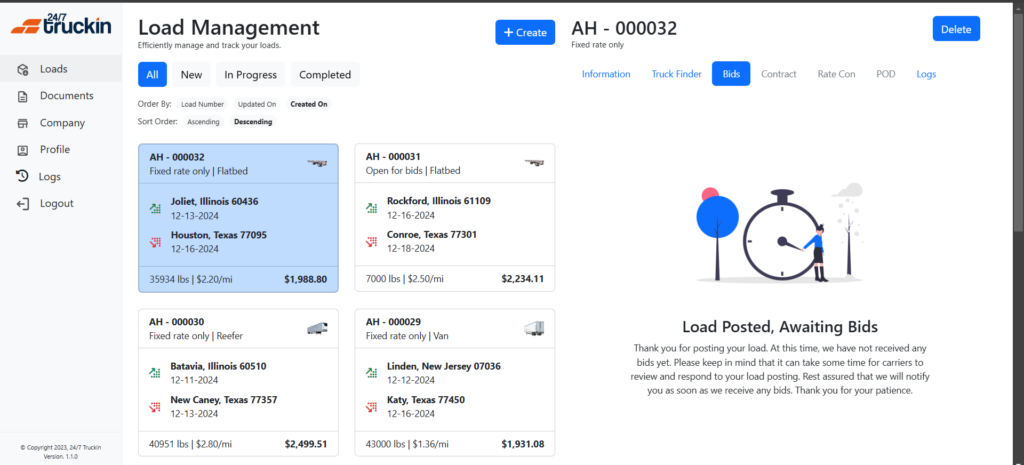A truck dispatcher plays a vital role in ensuring the seamless flow of the trucking industry, often acting as the bridge between drivers, brokers, and customers.
From orchestrating route planning and optimization to ensuring compliance with trucking regulations, their responsibilities are multifaceted and indispensable.
They ensure that every truck on the road is operating efficiently and meeting delivery timelines, which directly impacts profitability and customer satisfaction.

This blog serves as a comprehensive guide to understanding the core responsibilities of a truck dispatcher. It will also explore advanced skills such as dispatcher communication skills, customer relationship management in dispatching, and even emerging tech in this sphere.
Core Responsibilities of a Truck Dispatcher
Dispatchers manage logistics by coordinating routes, assigning loads, and monitoring deliveries to ensure efficiency. These responsibilities have been explained in detail below:
1. Route Planning and Navigation
A truck dispatcher plays a crucial role in route planning and optimization, ensuring drivers take the most efficient paths to save time and fuel.
By considering factors like traffic, road conditions, and weather, dispatchers can minimize delays and cut down on fuel costs.
Tools such as real-time tracking and GPS systems help dispatchers monitor routes in real-time, allowing for quick adjustments if issues arise. This level of precision ensures timely deliveries, improving customer satisfaction and fuel efficiency in dispatching.
2. Load Assignment and Freight Prioritization
Load assignment strategies are key to a dispatcher’s success. By utilizing freight prioritization techniques, dispatchers allocate loads based on delivery deadlines, truck capacity, and routes.
This ensures that drivers are working efficiently, reducing the chances of empty miles or delayed deliveries. Optimizing load distribution reduces operational costs, contributing to better profitability and service.
Proper load management is an essential skill for maintaining smooth operations while meeting customer expectations.
3. Communication and Problem-Solving
At the heart of the trucking industry, dispatchers serve as the central communication hub between drivers, brokers, and shippers.
Effective communication ensures that everyone stays updated on the latest information regarding load status, route changes, or delays.
Dispatchers must also be adept at problem-solving in trucking and managing unexpected issues such as breakdowns, accidents, or last-minute route changes.
For example, when a driver encounters heavy traffic or a missed delivery window, dispatchers step in to adjust routes and schedules, ensuring minimal delays.—either by rerouting, or adjusting the delivery schedule.
They can stay calm under pressure in any given circumstance.
4. Compliance and Regulations
Truck dispatchers ensure that drivers adhere to essential compliance and trucking regulations. This includes monitoring hours of service, weight restrictions, and other legal requirements that govern safe operations.
They help avoid costly fines or violations by keeping track of regulations and ensuring that drivers stay within the legal limits. Additionally, dispatchers support compliance audit processes, ensuring that all records are maintained and readily available for inspection.
By prioritizing compliance, dispatchers help the company stay legally compliant, ensuring smooth and uninterrupted operations.
How Dispatchers Keep Trucks Moving Smoothly
Dispatchers keep trucks moving smoothly by taking care of the schedules, and routes and resolving issues in real-time for optimal operations.

1. Efficient Driver Management
A truck dispatcher plays a crucial role in efficient driver scheduling, ensuring drivers are assigned routes that maximize productivity while complying with hours-of-service regulations.
Balancing schedules helps to minimize downtime and avoid burnout, creating a work environment that benefits both the driver and the company.
Dispatchers also incorporate driver retention strategies by keeping open lines of communication and addressing drivers’ needs, ensuring they remain motivated and satisfied.
By carefully managing schedules and maintaining a good work-life balance, dispatchers help reduce turnover and keep trucks moving efficiently.
2. Crisis Handling on the Go
In real-world scenarios, managing a crisis is a critical skill for dispatchers. When bad weather strikes or a delay occurs, dispatchers must think quickly to find solutions.
Real-time tracking allows dispatchers to monitor drivers’ locations and reroute them as needed, reducing the impact of disruptions.
Whether it’s adjusting routes due to road closure or finding an alternate route to avoid a traffic jam, dispatchers’ quick decision-making helps keep operations on track and minimizes delays.
Their ability to act swiftly ensures that trucks continue moving smoothly, even in challenging situations.
3. Strengthening Key Relationships
Truck dispatchers are integral to brokers’ and shippers’ relationship building.
They maintain constant communication and ensure coordination throughout the supply chain.
By understanding the specific needs and expectations of shippers, dispatchers help ensure that goods are delivered on time and in the most efficient manner.
Effective customer relationship management in dispatching fosters trust between dispatchers, brokers, and shippers, leading to stronger partnerships.
These relationships are key to maintaining a smooth operation and ensuring that deliveries meet deadlines, ultimately contributing to customer satisfaction and repeat business.
4. Streamlining Operations with Technology
Technology in dispatching has become helpful for enhancing operational efficiency.
Dispatch software offers real-time updates, allowing dispatchers to track trucks, adjust routes, and coordinate with drivers more effectively. This technology ensures that deliveries remain on schedule while optimizing routes for fuel savings and cost reductions.
Additionally, green dispatching practices, such as route optimization, help minimize fuel consumption and reduce emissions, promoting sustainability.
This integration of technology streamlines processes, making trucking more efficient and environmentally friendly.
The Future of Truck Dispatching
As the trucking industry evolves, truck dispatchers are increasingly leveraging innovative apps and tools to streamline their operations.
These advancements allow them to effectively manage routes, monitor deliveries, and communicate with drivers faster and more efficiently than ever before.
For example: apps that integrate real-time tracking among other advanced features are becoming more common, enabling dispatchers to monitor entire workflows from load posting to delivery without moving back and forth on different platforms.
One example is 24/7 Truckin. Dispatchers can use it to handle load, assign routes, and exchange documentation – all while staying on one platform, significantly enhancing productivity and reducing errors.
How 24/7 Truckin Helps Dispatchers Succeed
Dispatchers are the heart of every trucking operation. They plan routes, solve problems, and make sure everything runs smoothly.
24/7 Truckin makes their jobs easier.

Our all-in-one platform handles everything from load assignments to real-time tracking. It’s simple, efficient, and designed to save time. With 24/7 Truckin, you can focus on what matters most—keeping trucks on the road and running safely.
How about giving it a try for free? Use it for a month and continue only if you’re satisfied.
Book a free demo here.
